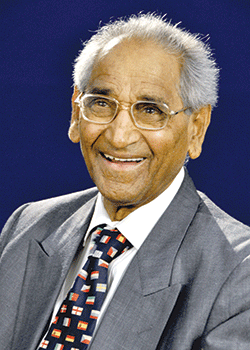 Dilip Thakore interviewed Dr. Jagdish Gandhi, founder-manager of the City Montessori School (CMS), Lucknow which, with an aggregate enrolment of over 53,000 students in 20 campuses across the city, is certified by Guinness World Records as the largest single city K-12 school worldwide. Excerpts:
Dilip Thakore interviewed Dr. Jagdish Gandhi, founder-manager of the City Montessori School (CMS), Lucknow which, with an aggregate enrolment of over 53,000 students in 20 campuses across the city, is certified by Guinness World Records as the largest single city K-12 school worldwide. Excerpts:
What were the objectives that prompted you to promote CMS in 1959?
As a young commerce student of Lucknow University, I was active in student politics and the country’s freedom movement. But after India attained its independence from British rule under the slogan Jai Hind, I gradually became aware of the greater importance of the slogan Jai Jagat — ‘victory to the world’ — coined by social reformer Vinoba Bhave. Convinced that children should be schooled to promote world peace and humanism from youngest age, together with my wife Bharti and borrowed capital of Rs.300, we started our first school in rented premises with just five students.
Since then, CMS has grown into the world’s largest K-12 school. But we have never veered from our belief that the purpose of education is the redemption of mankind from confusion, conflict and disunity. We believe that apart from excellence in academics, a 21st-century school should be a lighthouse providing meaningful education, spiritual direction, guidance and leadership to students, parents and society.
How satisfied are you with the growth, development and progress of CMS during the past 57 years?
Very satisfied. Apart from the recognition by the Guinness Book of Records as the largest city school of the world — which signifies parental satisfaction — CMS was awarded the 2002 Unesco Prize for Peace Education, the only school worldwide ever to have been conferred this honour. It is also a matter of great satisfaction that academically CMS is one of the country’s most respected schools. According to data compiled by thelearningpoint.net, CMS graduates by far the largest number of 90 percent-plus students in the class XII school-leaving exam of the Delhi-based CISCE (Council for the Indian School Certificate Examination) countrywide.
What are the distinguishing features of a CMS K-12 education?
CMS offers holistic education which includes material, human and divine education, imparted right through K-12. Apart from an academically rigorous education, we strive to provide spiritual direction and inculcate leadership qualities and community spirit in students. The objective is to make every child a gift of God to mankind, a pride of the human race, and one who embraces globalism. The CMS Junior Youth Empowerment Programme focuses on developing students’ identities, powers of expression and ability to make wise choices independently.
CMS hosts almost 30 international children’s symposia, education events and competitions including an annual International Conference of Chief Justices of the World. What’s their purpose?
The world is riddled with conflicts and chaos. Mahatma Gandhi said, “If we are to teach real peace in the world, and to wage a war against war, we shall have to begin with the children.” In CMS we have also adopted an expanded definition of education, believing that it must enable social transformation. That is why we organise these events to broaden students’ understanding about their role as harbingers of peace. By bringing children together from many countries and states of India, we enable children to appreciate that despite linguistic, religious and cultural diversity, human emotion and experience are common to people around the world.
Some other events are also organised for teachers, principals and societal stakeholders such as NGOs and thought-leaders, on school leadership, gender equality, law and justice, violence against children, environment preservation, peace and inter-religious dialogue.
There’s a nationwide shortage of trained teachers. How satisfied are you with the quality of your principals and teachers?
The quality of CMS teachers and principals can be gauged from the annual board results we produce, which are unparalleled despite the huge number of students who write the annual class X and XII CISCE board exams.
It is impossible to find readymade teachers for the type of roles they undertake in CMS. Therefore we have consciously created an environment in which they develop their classroom teaching and management skills, and also become self-driven through absorption of the school’s ethos.
What are the future plans of CMS?
CMS will continue to grow as a unique school by not just striving to maintain its excellent academic reputation, but also by expanding the opportunities for our students in every way through better pedagogy, improved infrastructure, integration of appropriate emerging educational technologies, an expanded study abroad programme and through exposure to music, sport, drama, debating and community service. We will also continue to produce generations of students sensitised towards affairs of the age and committed to building a more peaceful, united and just society. I am confident they will appreciate diversity, rise above narrow nationalism and take up decision-making global careers for the betterment of the world.